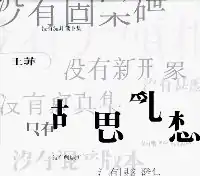Random Thoughts (Faye Wong album)
Random Thoughts[1][2] (Chinese: 胡思亂想), alternatively Thinking Here and There[3] or Wondering Music,[4] is the translated title of a 1994 Cantonese album recorded by Chinese Cantopop singer Faye Wong when she was based in Hong Kong. It confirmed her move into alternative music and covers songs by the Cocteau Twins, whose influence she readily acknowledged.[5]
| Random Thoughts 胡思亂想 | ||||
|---|---|---|---|---|
 | ||||
| Studio album by | ||||
| Released | June 1994 | |||
| Genre | Alternative rock, Cantopop | |||
| Label | Cinepoly | |||
| Faye Wong chronology | ||||
| ||||
The title track "Random Thoughts" is a cover of the Cocteau Twins' "Bluebeard". Track 5, "Know Oneself and Each Other", covered their song "Know Who You Are at Every Age", which was likewise from their 1993 album Four-Calendar Café.
"Dream Lover" (sometimes translated "Person in a Dream") is a cover of The Cranberries' "Dreams". It was a successful hit single, and was featured in Wong Kar-wai's critically acclaimed film Chungking Express in which Faye Wong also starred. She also recorded a Mandarin version, "Elude", on Sky.[6] Both versions are still played frequently in Chinese media.[7]
Track listing
| No. | Title | Writer(s) | Lyrics | Length |
|---|---|---|---|---|
| 1. | "胡思亂想 (Wu Si Lyun Seong)" (Random Thoughts) | Elizabeth Fraser, Robin Guthrie, Simon Raymonde | Lin Xi | 3:52 |
| 2. | "誓言 (Shi Yan)" (Pledge/Oath) | Dou Wei, Faye Wong | Faye Wong | 4:21 |
| 3. | "天與地 (Tin Jyu Dei)" (Heaven and Earth) | Richard Lam | 張宇 | 4:42 |
| 4. | "夢中人 (Mung Zung Yan)" (Dream Lover) | Dolores O'Riordan, Noel Hogan | 周禮茂 | 4:21 |
| 5. | "知己知彼 (Zi Gei Zi Bei)" (Know Oneself and Each Other) | Elizabeth Fraser, Robin Guthrie, Simon Raymonde | Lin Xi | 3:33 |
| 6. | "純情 (Seon Tsing)" (Innocence) | C.Y. Kong | Lin Xi | 4:31 |
| 7. | "遊戲的終點 (Yau Hei Dik Zung Dim)" (End of the Game) | 張宇 | Pan Yuan Liang | 4:55 |
| 8. | "夢遊 (Mung Yau)" (Sleepwalk) | C.Y. Kong | Lin Xi | 4:50 |
| 9. | "藍色時分 (Laam Sik Si Fan)" (Moment of Blue/Bluesy Moment) | 陳小霞 | Lin Xi | 4:12 |
| 10. | "回憶是紅色天空 (Wui Yik Si Hung Sik Tin Hung)" (Reminiscence is a Red Sky) | Alvin Leong | 陳少琪 | 4:14 |
| No. | Title | Length |
|---|---|---|
| 11. | "愛, 一次給不完" (Duet with Jacky Cheung) | 3:56 |
| 12. | "知己知彼" (Europe Mix) | 3:18 |
| 13. | "非常夏日" (Duet with Jacky Cheung) | 4:20 |
| No. | Title | Length |
|---|---|---|
| 11. | "愛, 一次給不完" (Duet with Jacky Cheung) | 3:56 |
| 12. | "知己知彼" (Europe Mix) | 3:18 |
| 13. | "容易受傷的女人" (Mandarin Version) | 4:17 |
| 14. | "忘掉你像忘掉我" | 4:21 |
| 15. | "非常夏日 (Live in Chicago 1975)" (Duet with Jacky Cheung) | 3:56 |
Cover art
The album cover was unusual for its time: instead of any image of the singer's face, the main cover design shows overlapping phrases such as "no new images" and "no photo booklet" in Chinese characters of varying size, all of which have some strokes missing but allowing the phrase still to be discerned.[2][5] An alternative cover was all white except for the artist and album name, the latter in the same partial characters.
The cover was the first to include the Mandarin name 王菲 (Wang Fei).[2]
References
- Shane Homan, Access All Eras: Tribute Bands and Global Pop Culture, 2006, p228. "Faye Wong (1993) 100,000 Whys? Hong Kong: Cinepoly. Faye Wong (1993) No Regrets. Hong Kong: Cinepoly. Faye Wong (1994) Mystery. Hong Kong: Decca/Cinepoly. Faye Wong (1994) Random Thoughts. Hong Kong: Cinepoly."
- Chan, Boon (28 October 2011). "Faye's back". The Straits Times. Singapore. p. C2.
- Anthony Fung and Michael Curtin, "The Anomalies of Being Faye (Wong): Gender Politics in Chinese Popular Music", International Journal of Cultural Studies 5, no. 3 (September 2002) 'Wu Shi Lun Shung' (Thinking Here and There, 1994),
- Faye Wong is all woman – Taipei Times Max Woodworth 2004 "Wong also had a brief fascination for the ethereal music of the Cocteau Twins in the mid-1990s, which manifested itself in three covers of the Scottish band's songs on Wondering Music (胡思亂想, 1994) and collaborations with the band on Impatience (浮躁, 1996), and Faye Wong (快樂不快樂, 1997).
- 胡思亂想 (in Chinese). Douban. Retrieved 11 June 2011.
- Balmont, James (13 February 2021). "How Chungking Express brought dream pop to Hong Kong". Little White Lies.
- An encore for Faye Wong, China Daily, 11 December 2009